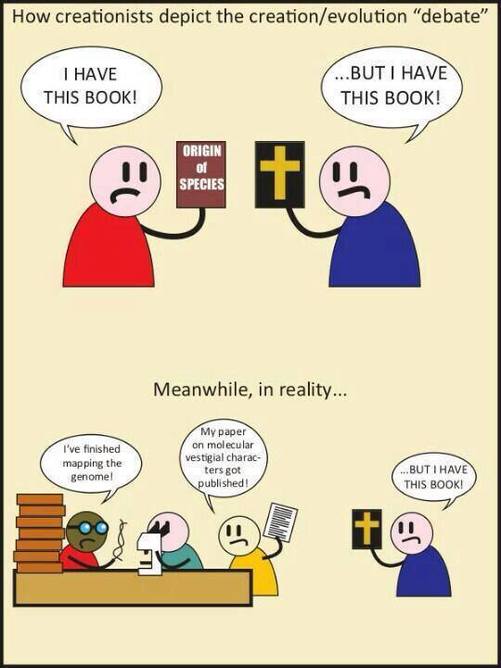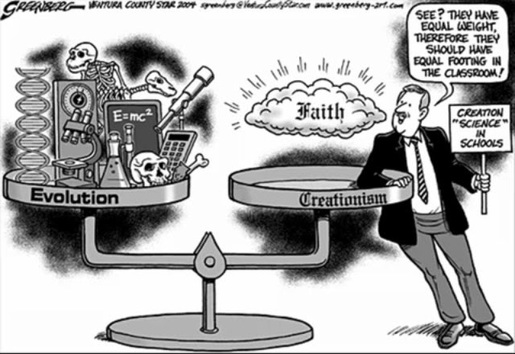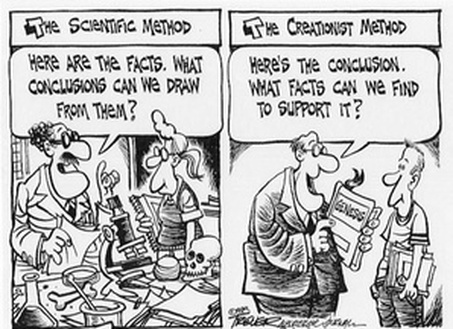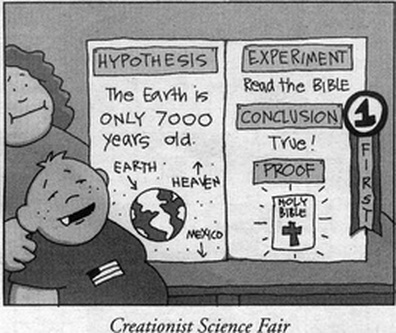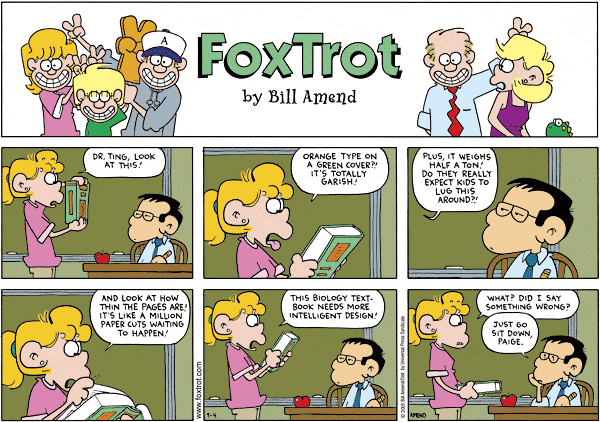Why I Wholeheartedly Accept Organic Evolution
"If God didn't use evolution, he must have gone out of his way to make us think he did." - Robert T. Bakker, paleontologist and Ecumenical minister, in The Dinosaur Heresies
"Nothing in biology makes sense except in the light of evolution." - Theodosius Dobzhansky, biologist and Russian Orthodox Christian
"Evolution is a bankrupt speculative philosophy, not a scientific fact. Only a spiritually bankrupt society could ever believe it. Only atheists could accept this Satanic theory." - Jimmy Swaggart, scandalist and Pentecostal pastor
See also: Why Latter-day Saints Should Embrace Evolution, Review of the "Uncommon Hour", and my Facebook group, Latter-day Saints Who Love Latter-day Science
"Nothing in biology makes sense except in the light of evolution." - Theodosius Dobzhansky, biologist and Russian Orthodox Christian
"Evolution is a bankrupt speculative philosophy, not a scientific fact. Only a spiritually bankrupt society could ever believe it. Only atheists could accept this Satanic theory." - Jimmy Swaggart, scandalist and Pentecostal pastor
See also: Why Latter-day Saints Should Embrace Evolution, Review of the "Uncommon Hour", and my Facebook group, Latter-day Saints Who Love Latter-day Science
For much of my time as a member of The Church of Jesus Christ of Latter-day Saints, I accepted organic evolution - wholeheartedly, too, not tentatively or just a little. Some fellow Saints and many other Christians would have accused me of being deceived by Satan. Bruce R. McConkie would have accused me of having a "weak and puerile intellectuality" (Mormon Doctrine, p. 256) and Joseph Fielding Smith would have called me "a weak-kneed and unbelieving religionist, who is constantly apologizing for the miracles of the scriptures, and who does not believe in the divine mission of Jesus Christ" (Doctrines of Salvation, p. 143). I consider myself neither of those things then or now, but I suppose God's opinion is the only one that matters.
I accepted evolution as a child because I read about it in my dinosaur books, but then the writings of those men and the arguments of my parents persuaded me not to. (My parents both since claim they accept evolution too, so I don't know what to make of that.) I spent some time around creationist forums and Facebook pages, arguing with atheists alongside fellow Christians, until the atheists left and the Christians turned on me because I was a Mormon. (By the way, this whole time I still accepted that the Earth was millions of years old and never believed that evolution was an evil scientific conspiracy. I had some pride.) I had cognitive dissonance telling me that my beliefs made no sense, but I drowned it out. When I started college I reopened my mind because I had to learn about evolution in biology; I wasn't looking to have my opinion reversed again, but neither was I going to spend the whole semester thinking "That's not true. That's not true." It would have made the class rather less enjoyable.
Sometime in my second semester I realized "This makes perfect sense. I think I believe it". Of course, I was mostly remembering that it makes perfect sense, because much of what I was learning I had already known and just shoved into a closet in the back of my mind somewhere (along with the cognitive dissonance). After college let out for the summer I spent some time at Aunt Rachel's and Uncle Craig's house, where I read Finding Darwin's God by Catholic biologist Kenneth Miller. It explained how evolution and theism are compatible and addressed some of the arguments that my creationist fair-weather friends had loved to toss around. By the final page, my acceptance was solidified. I had the courage to come out of the closet and admit to myself and others that I accepted evolution. To say that it felt good would be an understatement. In the following pages, I'll explain how I find both spiritual and intellectual satisfaction in this "new" worldview.
I accepted evolution as a child because I read about it in my dinosaur books, but then the writings of those men and the arguments of my parents persuaded me not to. (My parents both since claim they accept evolution too, so I don't know what to make of that.) I spent some time around creationist forums and Facebook pages, arguing with atheists alongside fellow Christians, until the atheists left and the Christians turned on me because I was a Mormon. (By the way, this whole time I still accepted that the Earth was millions of years old and never believed that evolution was an evil scientific conspiracy. I had some pride.) I had cognitive dissonance telling me that my beliefs made no sense, but I drowned it out. When I started college I reopened my mind because I had to learn about evolution in biology; I wasn't looking to have my opinion reversed again, but neither was I going to spend the whole semester thinking "That's not true. That's not true." It would have made the class rather less enjoyable.
Sometime in my second semester I realized "This makes perfect sense. I think I believe it". Of course, I was mostly remembering that it makes perfect sense, because much of what I was learning I had already known and just shoved into a closet in the back of my mind somewhere (along with the cognitive dissonance). After college let out for the summer I spent some time at Aunt Rachel's and Uncle Craig's house, where I read Finding Darwin's God by Catholic biologist Kenneth Miller. It explained how evolution and theism are compatible and addressed some of the arguments that my creationist fair-weather friends had loved to toss around. By the final page, my acceptance was solidified. I had the courage to come out of the closet and admit to myself and others that I accepted evolution. To say that it felt good would be an understatement. In the following pages, I'll explain how I find both spiritual and intellectual satisfaction in this "new" worldview.
Creationists claim the evidence is being misinterpreted and/or that we don't have all of it yet. Obviously scientists make mistakes like anybody and obviously we don't know everything. But as the days and months and years go by, evolution only becomes more feasible, not less. Scientists doing a study can say "If evolution is true then here's what we expect to find" and hey presto, they find it. Furthermore, any other explanation for this evidence requires ludicrous mental gymnastics. So although we will undoubtedly reevaluate many particulars, don't hold your breath for the whole thing to be disproven anytime soon - and even if it was, creationism wouldn't somehow emerge victorious by default, because it would still be lacking evidence. If evolution is false then I don't see how you can escape the conclusion that God is deliberately messing with our minds. The God I worship doesn't operate that way.
Time considerations prevent me from discussing most of this evidence (although I will address criticisms further on), and none of it is based on my own research or thinking skills anyway. But don't take that as a cop-out; you can read all about for yourself it in myriad books and websites. And to be clear, when I speak against "creationism", I'm not saying that I don't believe God created the world and all life. It's the methodology I disagree with. (No Latter-day Saint should be "creationist" in the usual sense anyway because our doctrine rejects "creatio ex nihilo", creation out of nothing, and instead posits that God organized pre-existing matter into the heavens and Earth. This jives better both with the laws of matter and a more accurate translation of Genesis 1:1.) I use the term as it is commonly understood, which refers to at least a few different paradigms (though individual beliefs within them may vary).
*Young earth creationism is a completely literal reading of the English (usually KJV) translation of Genesis which renders not only the earth but the entire universe only a few thousand years old. Dinosaurs lived alongside humans, and fossils and geological formations were made by Noah's flood. (But the dinosaurs didn't die out in Noah's flood - they were on the Ark with all the other animals and then disappeared some time later because reasons.) This worldview declares all-out war on geology, biology, chemistry, physics, cosmology, paleontology, and common sense.
*Old earth creationism accepts that the earth is millions of years old, thus declaring war on one less field of science, but without evolution it fails to explain the succession of species throughout this history or why they all look so similar to their predecessors. Despite being slightly less implausible on the surface, it's technically even more illogical than the young earth variety.
*And finally, intelligent design is creationism given a few cosmetic tweaks and a different name to make it sound scientific so it would be taught in schools. Its basic premise is that mutation and natural selection aren't sufficient to account for the complexity and diversity of life, so a designer must have been involved. It claims that this "designer" is generic and not an attempt to promote the Judeo-Christian God per se, but this is easily recognized as baloney.
*Young earth creationism is a completely literal reading of the English (usually KJV) translation of Genesis which renders not only the earth but the entire universe only a few thousand years old. Dinosaurs lived alongside humans, and fossils and geological formations were made by Noah's flood. (But the dinosaurs didn't die out in Noah's flood - they were on the Ark with all the other animals and then disappeared some time later because reasons.) This worldview declares all-out war on geology, biology, chemistry, physics, cosmology, paleontology, and common sense.
*Old earth creationism accepts that the earth is millions of years old, thus declaring war on one less field of science, but without evolution it fails to explain the succession of species throughout this history or why they all look so similar to their predecessors. Despite being slightly less implausible on the surface, it's technically even more illogical than the young earth variety.
*And finally, intelligent design is creationism given a few cosmetic tweaks and a different name to make it sound scientific so it would be taught in schools. Its basic premise is that mutation and natural selection aren't sufficient to account for the complexity and diversity of life, so a designer must have been involved. It claims that this "designer" is generic and not an attempt to promote the Judeo-Christian God per se, but this is easily recognized as baloney.
In the following pages I explain that evolution is not against Latter-day Saint doctrine, how creationism embarrasses and damages Christianity, how and why evolution applies to humans specifically, a list of oft-repeated criticisms against evolution with brief responses, and a conclusion with some thoughts on how I synthesize evolution with my faith without diluting either. Maybe it will help others' faith as well.

